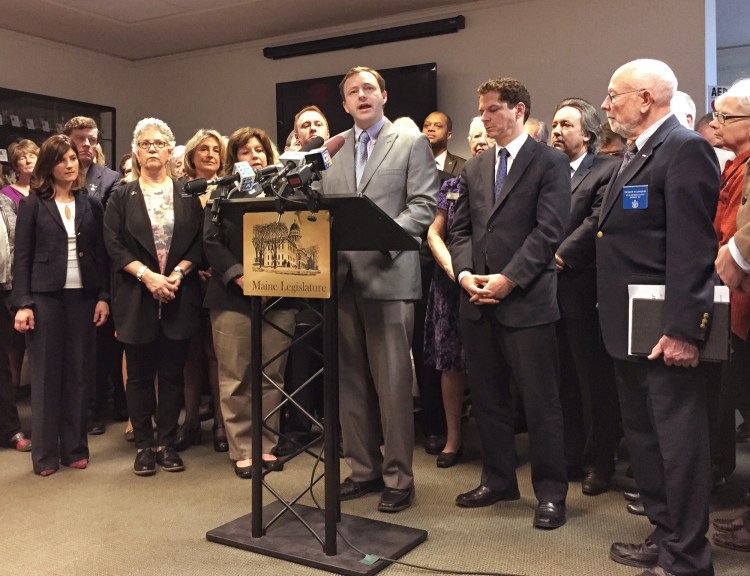AUGUSTA — Democrats unveiled a package of welfare reforms Thursday that they predicted would help fix a “broken” system, prompting Republicans to point out that they have made similar proposals for years.
The Democratic plan contains new programs aimed at helping recipients move out of poverty, but also revives a proposal to stop welfare dollars from being spent on alcohol, cigarettes, lottery tickets and tattoos. Democrats claim their plan also would increase accountability by establishing an “oversight board” and converting some cash benefits into direct payments to landlords.
Yet the introduction of the proposals late in an election-year session – combined with past partisan fighting over welfare – raises questions about whether lawmakers will be able to accomplish major reforms this year.
“Mainers, we have heard you,” House Speaker Mark Eves, D-North Berwick, said Thursday morning. “We know that Maine’s welfare system is broken. It’s not working for taxpayers and its successes in helping people get out of poverty are too few and far between.”
Republican legislative leaders said they welcomed the discussion, but were quick to accuse Democrats of engaging in election-year politics on what has been a core issue for Republicans.
“As early as a year ago, many of the Democrats voted against these exact same proposals,” said House Minority Leader Kenneth Fredette, R-Newport. “So we welcome them to the party and I think this is clearly a recognition of the fact that in their upcoming election cycle, they want to be on the right side of this issue. And they haven’t been now for six years.”
BOTH PARTIES SUPPORT RESTRICTIONS ON EBT CARDS
Flanked by Democratic colleagues, Eves and Senate Minority Leader Justin Alfond, D-Portland, announced proposals to:
• Ban the use of electronic benefits cards, also known as EBT cards, to purchase alcohol, tobacco, tattoos, lottery tickets, guns and other items.
• Convert $5 million in what are now cash benefits available to welfare recipients into direct payments to landlords.
• Create a Citizen Oversight Board to ensure that welfare programs are effective.
• Replace the “one-size-fits-all” assistance available through the Temporary Assistance to Needy Families program, or TANF, with separate “tracks” catering to individual needs, such as workforce skills or behavioral health treatment.
Several of the initiatives proposed Thursday by Democrats have been sought by Republican lawmakers, as well as Gov. Paul LePage, but failed to pass the Legislature.
Both parties have said they support restrictions on EBT cards to prevent welfare recipients from using taxpayer dollars to pay for cigarettes, alcohol or tattoos. But past attempts to enact restrictions – some introduced by Republicans, some by Democrats – have run into opposition or partisan politics.
For instance, in 2014, House Democrats gutted a LePage bill that would have prohibited TANF funds from being used to make such purchases. A Senate Democrat later amended the bill to restore many of those prohibitions – without the support of Senate Republicans – but the legislation died between the House and Senate.
Reports late last year that people receiving public assistance have won $22.4 million in lottery prizes since 2010 have increased bipartisan support for restrictions on how welfare funds are used.
LePage spokeswoman Adrienne Bennett said the governor was “all in” on the proposal to block purchases of alcohol and tobacco with EBT cards. Other aspects of the Democrats’ plan – such as changing or expanding TANF benefits – were likely “DOA,” or dead-on-arrival, with the governor, Bennett said.
She also characterized the Democratic proposal as a “last-minute Hail Mary in the fourth quarter” in hopes of scoring some election-year points with voters.
“We’ve always been interested in ways to root out the abuse and fraud in the system and we have been working on that for years,” Bennett said. “The fact of the matter is the governor started this conversation five years ago and Democrats have not been fully involved. Now that they want to get on the wagon, we welcome it.”
REACTIONS FROM ADVOCATES FOR THE INDIGENT
The Democrats’ proposal received a lukewarm response from some advocates for low-income Mainers, and even from some Democrats.
Robyn Merrill, executive director of the nonprofit legal aid organization Maine Equal Justice Partners, said she was pleased to see Democrats offering a “proactive” plan that seeks to better tailor welfare programs to individuals’ needs. But Merrill was concerned that the proposed EBT card restrictions on alcohol, tobacco or lottery tickets play into unfounded stereotypes about welfare recipients.
“The reality is most people are using their benefits to pay for housing, diapers or other basic needs,” Merrill said.
Rep. Gina Melaragno, an Auburn Democrat who identifies herself as a progressive, criticized her Democratic colleagues’ news conference as perpetuating “the slander of character of low-income people.”
“It’s as if they think all people who rely on public assistance are chain-smoking, alcoholic, chronic gamblers who need to be bailed out of jail on a regular basis,” Melaragno wrote in an email. “It’s an unfair and false character assessment of low-income people.”
Melaragno said many welfare recipients are already working, and she criticized welfare-to-work programs as often merely funneling people into low-wage jobs that do not help them climb out of poverty.
The Democrats’ proposals were discussed Thursday afternoon during a work session in the Legislature’s Health and Human Services Committee. It was unclear when the committee would vote on them. However, lawmakers are facing a host of complicated policy issues they will have to resolve in the next several weeks if the Legislature hopes to meet its mid-April adjournment goal.
Asked about the decision to propose the welfare reforms so late in the session, Alfond and Eves said lawmakers were busy addressing the tax conformity and education funding issues that passed the Legislature this week.
“We have enough time to do this right and we are calling on all of our colleagues – Democrat, Republican, independent – to sit down at the table and get this one right,” Eves said.
“It’s time to stop the political bickering,” Alfond said. “It’s time to stop playing people’s lives like it is a football game and let’s address the issues … and put together a plan that can work for Maine people, Maine taxpayers and especially for people who are having a tough time in their lives.”
Send questions/comments to the editors.




